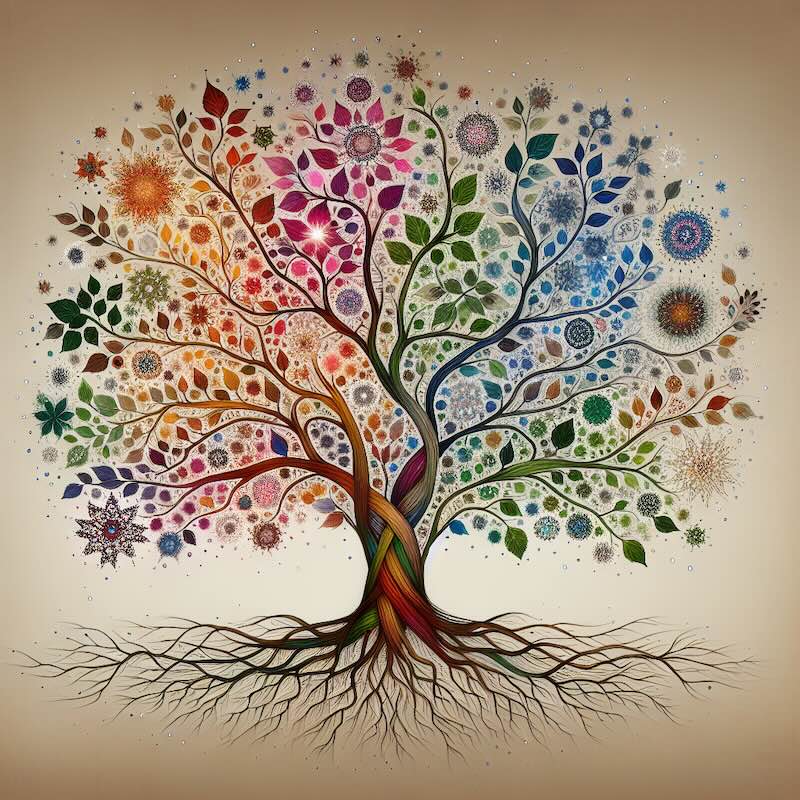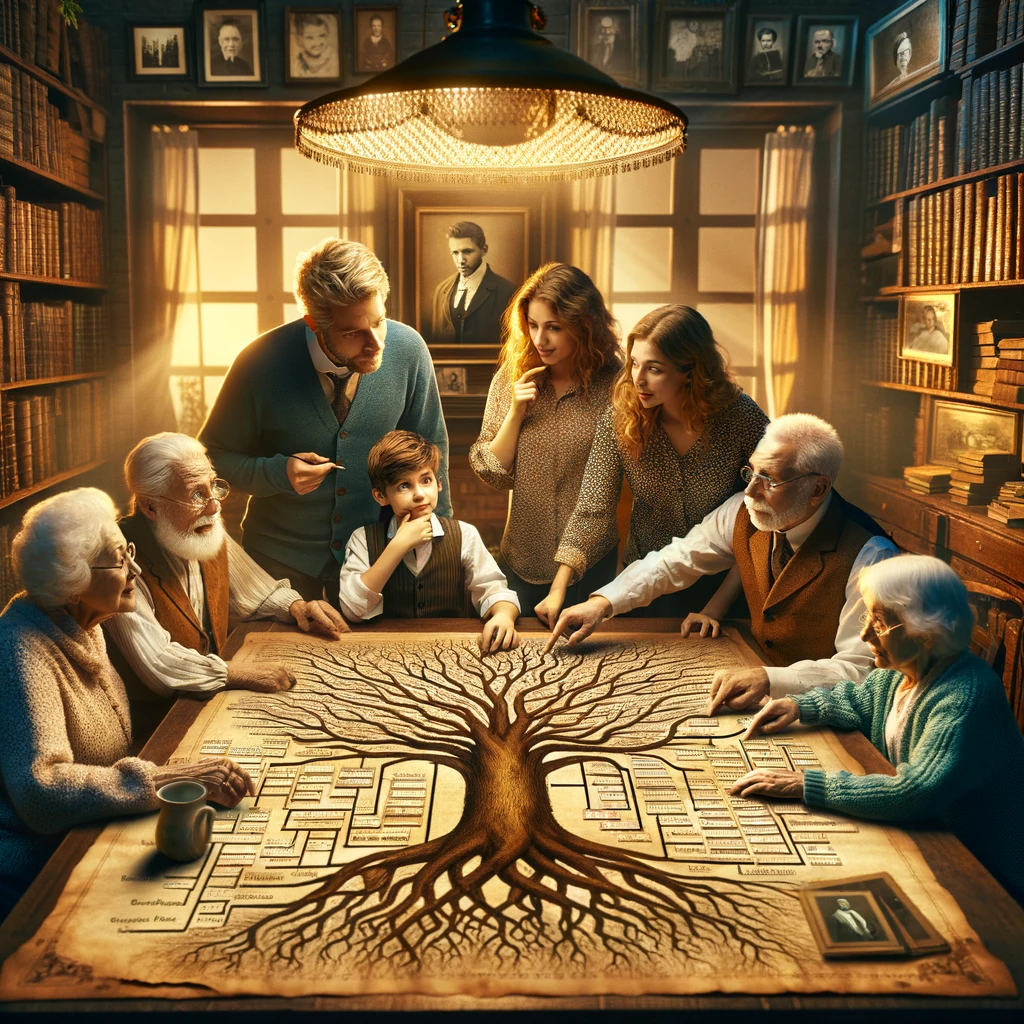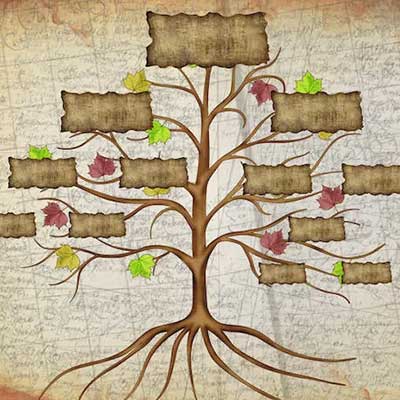- Home
- Family Tree and Family History
Family Tree and Family History
Discover the intriguing world of family tree and family history! Uncover long-lost relatives and fascinating family tales that span generations, and understand how tracing your ancestry can deepen your understanding of yourself and your unique past - then embark on your own family tree adventure!
Do you ever find yourself wondering about your roots and origins? This fascinating article will delve into the fascinating world of family trees and genealogy research. Learn how tracing your ancestry can reveal new insight into yourself and your family history - uncover fascinating tales, long-lost relatives, and connections that span generations! So please grab a cup of tea and embark on our family tree journey together!
Explaining the Concept of a Family Tree
Exploring your family history can be like embarking on an exhilarating adventure through time, connecting you to your ancestors and deepening your sense of identity. A family tree visually depicts this journey by visualizing your lineage and relationships among family members. A genealogy tree displays your ancestors, descendants and connections across generations into one visual image to simplify understanding your history.
An Introduction to Family Trees
Delving into your family history can provide more than just names on a chart; it helps reveal who and where you come from, providing a sense of belonging and identity as you unearth stories and experiences of your ancestors that shed light on struggles, achievements, cultural heritages that shaped them all - strengthening family bonds while simultaneously appreciating your collective history. But simply creating a Family Tree won't do justice -
Accumulating Information
Gathering information is critical to building your family tree. Speak with immediate family members and ask them about their knowledge and memories; collect important details like birth dates, marriage dates, and locations. Interviews may provide invaluable anecdotes that give greater depth to your history. You can encourage older relatives to share personal recollections as their memories may hold insight not found elsewhere.
Once you've collected all of the required information, it's vital to organize it to be easily understood and accessible. Begin by creating a basic family tree structure including yourself, your parents and siblings; expand by adding generations going back in time until it reaches today; use software or online tools tailored explicitly for creating family trees to maintain an organized presentation; these often offer customizable templates and features which make entering and visualizing family history simpler.
Utilizing Online Tools and Resources Thanks to technology advancements, creating a family tree has become more accessible through various online tools and resources. Numerous websites and software platforms cater to different levels of expertise with user-friendly interfaces and vast databases like Ancestry.com, MyHeritage, and FamilySearch, offering access to historical records like birth certificates, marriage records and census data which you can search and verify yourself - saving both time and effort when researching family history as you uncover new branches or connections in your family tree.
Benefits of Tracing Family History
Tracking Family Histories
Tracing your family history can provide an invaluable way of discovering personal identity and heritage. Connecting you with your roots gives a more profound sense of who you are while learning their cultural, ethnic and geographical backgrounds can shed light on your unique traditions and values and provide a greater appreciation of who you are as an individual.
Strengthening Family Bonds
Investigating family history can be a bond-fortifying team effort that unites family members. You can involve relatives in your research efforts and foster an atmosphere of teamwork by discussing family stories or uncovering forgotten narratives - creating shared memories which build bridges of understanding between relatives. Learning from each other allows us to understand one another more deeply while strengthening connections.
Discovering Medical and Genetic Insights
Family history research can yield invaluable medical and genetic insights that benefit present and future generations. Researching your family tree's medical conditions and patterns can provide a greater understanding of potential health risks and predispositions to certain illnesses or genetic predispositions; using this knowledge allows you to make more informed decisions regarding your health and well-being - especially useful in discussions with healthcare providers.
Preserving Cultural Traditions Conserving cultural traditions is central to family history research. By learning about your ancestor's customs, beliefs, and practices, you can keep these alive within your own family - from celebrating specific holidays or cooking traditional recipes all the way to participating in ancestral rituals - celebrating and honoring one's cultural heritage can strengthen bonds among different generations while maintaining continuity over time.
Challenges In Researching Your Family Tree and Family History
Limited Access to Records
One of the challenges associated with family history research lies in finding accurate records. Some may be lost or destroyed over time, making locating accurate information in foreign ancestry lines more complex. Also, access may be restricted so you can find creative solutions and alternative sources of knowledge for your research project.
Accuracy and Reliability
A crucial part of researching family history involves assuring its accuracy and reliability. Historical records can contain errors, contradicting information or even deliberate falsification; to ensure validity, cross-reference multiple sources and critically analyze any findings you discover. Partnering with other researchers or professionals in the field can offer additional insights that help distinguish fact from fiction.
Language and cultural barriers may create challenges when researching family history, particularly when exploring ancestral roots outside your culture. Translating documents between languages or understanding cultural nuances may be challenging; addressing this problem effectively and uncovering valuable information faster may be difficult. If this becomes difficult, seek assistance from language experts, cultural organizations, or professional translators to overcome these hurdles and gain new insights.
Research Tips and Techniques for Family History Research
Start Your Research Within Immediate Family
It is often best to begin family history research within your immediate family. Contacting parents, grandparents, and siblings to gather knowledge and memories will help lay down a strong foundation and give you a starting point for further investigations. Documenting any information collected will serve as an invaluable reference points as you delve further into family history research.
Interviewing Elder Relatives
Meeting your grandparents, great-aunts, and uncles who have lived through different eras can provide invaluable insight into your family history. Arrange interviews or informal conversations to tap into their knowledge and experience. Encourage them to share memories from their younger years - these personal narratives often add depth and context to your tree! Record these discussions or take notes so their memories remain for future generations.
Exploring Written Records and Documents
Written records and documents are crucial in family history research. Birth certificates, marriage licenses, immigration papers, and wills prove your ancestors' existence. They can help you establish their place within your tree. Such records may be accessible via various sources like archives, government agencies, libraries, or online databases - take advantage of them to corroborate information and gain greater insight into family history!
DNA Testing
DNA testing has revolutionized genealogy research, offering new possibilities for uncovering ancestral connections. By providing a DNA sample and taking part in DNA tests, you may disclose genetic information that links distant relatives or sheds light into ethnic roots. DNA tests complement traditional research methods by filling gaps or verifying existing information, with many companies offering DNA test services and offering results which can then be incorporated into family trees to give more comprehensive views of your heritage. When Documenting and Sharing the Family Tree
Choose the Best Format
When documenting your family tree, there are various formats you can select that best meet your preferences and needs. Traditional options for genealogy documentation may involve creating physical charts using pen and paper or software programs designed specifically for genealogy; digital family trees created using online platforms and apps offer greater flexibility and allow easy sharing. When choosing, carefully consider each format's advantages regarding level of detail, accessibility and long-term sustainability before selecting the best-suited one.
As you document your family tree, including relevant details and stories to bring it to life is vital. Aside from names, birth dates, and locations, try adding stories about anecdotes, photographs, or significant events that provide additional depth and curiosity into their lives; creating an engaging family tree while safeguarding its legacy for future generations.
Sharing Your Family Tree and Family History
Engaging your extended family members is an excellent way to foster a sense of connection and engagement. It establishes a common repository of family history information. Reunions or online groups dedicated to family history provide a forum for sharing stories, photos, research findings and findings; strengthening familial bonds while simultaneously passing down this history from generation to generation.
Maintaining and Updating the Family Tree
Engaging family members
Updating and expanding a family tree requires participation from multiple family members. Encourage each of your relatives to actively contribute to it by sharing knowledge, photos, and stories from within their respective generations or branches of interest. Designate specific generations as tasks for individual family members so they may conduct independent research to add depth to the collective knowledge base. Making family history collaborative will ensure your tree remains an ever-evolving representation of shared heritage.
As your family expands and new generations come into being, they must be properly included into your family tree. Celebrate children born into your family through marriages or relationships as an opportunity to expand the tree and strengthen relationships between family members. Regularly update your tree to reflect changes, providing future generations a comprehensive view of their lineage.
Consulting and Collaborating With Other Researchers
Partnering with other researchers or joining genealogy communities can offer invaluable insights, advice, and shared research resources. Engaging with like-minded people who share your interests can lead to new discoveries while helping overcome challenges. Attend genealogy conferences, online forums, or local genealogy societies to expand your network and benefit from fellow researcher's collective expertise.
Discovering Unexpected Ancestral Connections
Exploring Migration Patterns
While researching your family tree can reveal surprising ancestral connections through migration studies, tracking migration patterns may reveal even more surprises. Many families have stories of ancestors moving between countries or regions for work or as they escape hardship - uncovering these migration stories may help find unexpected ties among different branches and give insight into the diverse backgrounds that contributed to building your family tree.
Discovering Prominent Ancestors
Exploring your family tree could reveal surprising ancestors whose accomplishments and contributions you never imagined! Be they historical figures, influential artists or successful entrepreneurs - such findings add a layer of excitement and interest that opens up endless avenues of investigation and further study.
Exploring Your Family History
Exploring your ancestry history may reveal unexpected ethnic or cultural backgrounds within your lineage, from different regions or ethnic groups contributing to your identity and heritage. Acknowledging and accepting these diverse backgrounds broadens your understanding of yourself and where you fit in the world; and fosters tolerance, appreciation of different cultures, and unity within diverse family members. Preserving Family Heirlooms and Memorabilia
Family genealogy research often uncovers many old photographs and documents with significant sentimental or historical value that must be protected for future generations. Archival materials should be acid-free to prevent damage caused by light, heat, and moisture; digitizing copies might make sharing them with family easier than having physical access alone.
Display Family Heirlooms and Treasures
Family heirlooms and keepsakes provide tangible connections to your ancestors and their lives, as reminders and symbols of who we are as individuals. Integrating them into your living space - antique furniture, jewelry from an inheritance, framed documents or important photos - creates an emotionally enriching and visually appealing setting.
Digitizing and Archiving for Future Generations
As technology becomes ever more accessible, digitizing and archiving your family history becomes even more essential to its preservation for future generations. Utilize this technology to create digital backups of your family tree, photographs, documents and any other pertinent materials such as family documents. Archiving digitally also makes sharing information with family easier across geographical distances while offering convenient access regardless of geographical location - consider creating not just your family tree but interviews, photographs and stories to ensure its legacy will live on for many more years!











